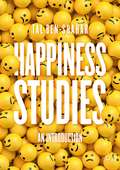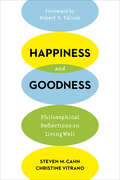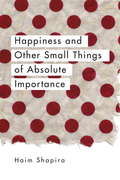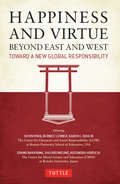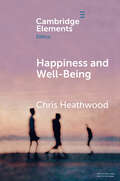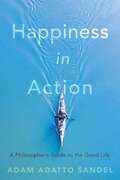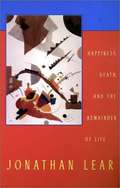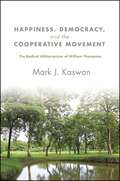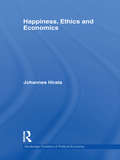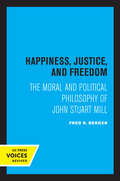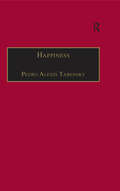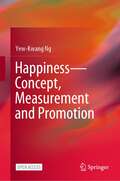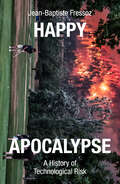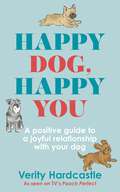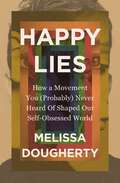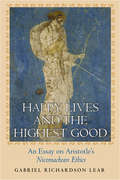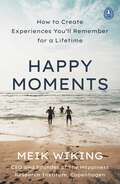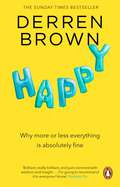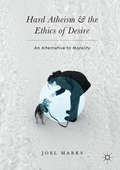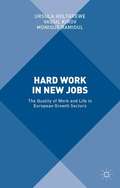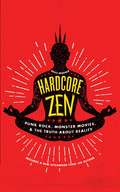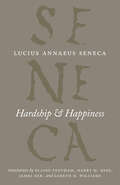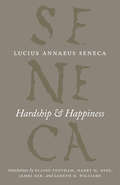- Table View
- List View
Happiness Studies: An Introduction
by Tal Ben-ShaharIn this book, Tal Ben-Shahar introduces a new interdisciplinary field of study that is dedicated to exploring happiness. The study of happiness ought not be left to psychologists alone. Philosophers, theologians, biologists, economists, and scholars from other disciplines have explored ways of attaining happiness, and to do justice to this important pursuit, we ought to listen to their words and experiment with their prescriptions. Not only does the field of happiness studies embrace different disciplines, it also approaches happiness as a multifaceted and multidimensional variable that includes five parts which form the acronym SPIRE:Spiritual wellbeingPhysical wellbeingIntellectual wellbeingRelational wellbeingEmotional wellbeing This book addresses each of these elements of happiness, explains them, and addresses practical ways for their cultivation.
Happiness and Goodness: Philosophical Reflections on Living Well
by Christine Vitrano Steven CahnHow should we evaluate the success of each person's life? Countering the prevalent philosophical perspective on the subject, Steven M. Cahn and Christine Vitrano defend the view that our well-being is dependent not on particular activities, accomplishments, or awards but on finding personal satisfaction while treating others with due concern.The authors suggest that moral behavior is not necessary for happiness and does not ensure it. Yet they also argue that morality and happiness are needed for living well, and together suffice to achieve that goal. Cahn and Vitrano link their position to elements within both the Hellenistic and Hebraic traditions, in particular the views of Epicurus and lessons found in the Book of Ecclesiastes. Written in an accessible style and illustrated with incisive vignettes drawn from history, literature, films, and everyday life, Happiness and Goodness is a compelling work of philosophy for anyone who seeks to understand the nature of a good life.
Happiness and Goodness: Philosophical Reflections on Living Well
by Steven M. Cahn Christine Vitrano&“A phenomenal book that offers innovative and penetrating insights into the most fundamental questions of human concern . . . vivid and enjoyable.&”—Dov Weiss, University of Illinois at Urbana-Champaign How should we evaluate the success of each person&’s life? Countering the prevalent philosophical perspective on the subject, Steven M. Cahn and Christine Vitrano defend the view that our well-being is dependent not on particular activities, accomplishments, or awards but on finding personal satisfaction while treating others with due concern. The authors suggest that moral behavior is not necessary for happiness and does not ensure it. Yet they also argue that morality and happiness are needed for living well, and together suffice to achieve that goal. Cahn and Vitrano link their position to elements within both the Hellenistic and Hebraic traditions, in particular the views of Epicurus and lessons found in the Book of Ecclesiastes. Written in an accessible style and illustrated with incisive vignettes drawn from history, literature, films, and everyday life, Happiness and Goodness is a compelling work of philosophy for anyone who seeks to understand the nature of a good life. &“Reminds me of a Socratic dialogue. The absence of jargon and use of realistic examples in this book make philosophy accessible to all interested in improving their lives.&”—Andrea Tschemplik, American University &“This crisply written and incisive book draws on ancient thought and contemporary examples to develop a compelling account of living well.&”—David Shatz, Yeshiva University &“I can&’t remember the last time I read a book about ethics that was so fascinating.&”—Ed Lake, deputy editor, Aeon
Happiness and Other Small Things of Absolute Importance
by Haim ShapiraWhat is your happiest moment? How can you know it? Do we waste time or does time waste us? Are questions about meaning truly meaningful? What's really important? How do our emotions, our desires, our imagination and our understanding of our ever changing relationship with meaning help us to define and understand what happiness really means and what really matters. Drawing on literary and philosophical sources ranging from Alice in Wonderland, Winnie the Pooh and The Little Prince to Descartes and Nietzche, Haim Shapira invites us to challenge our perspectives on happiness and provides us with alternative ways we may view what is important. As Haim concludes it is the spaces in between the possible paths that we might take, where we are able to find a place of grace that the important things that matter to us will light our way. The choice is ours.
Happiness and Virtue Beyond East and West
by Kevin Ryan Karen E. Bohlin Osamu Nakayama Kazunobu Horiuchi Bernice LernerHappiness and Virtue Beyond East and West presents an important series of essays from Japanese and American authors examining essential virtues shared by both Eastern and Western cultures with the ultimate goal of allowing happiness to be realized in a globally and socially responsible manner.Each chapter examines one of nine virtues-Courage, Justice, Benevolence, Gratitude, Wisdom, Reflection, Respect, Responsibility and Temperance-and the importance of each in our lives.With clarity of purpose the essays demonstrate that the virtues and happiness that living a good life can bring know no national boundaries. It is the sincere hope of the editors and authors that this book will help its readers reexamine the timeless question of what constitutes true happiness and a good life and will therefore play some part in increasing international cooperation and good will.
Happiness and Well-Being (Elements in Ethics)
by Chris HeathwoodThis Element provides an opinionated introduction to the debate in moral philosophy over identifying the basic elements of well-being and to the related debate over the nature of happiness. The question of the nature of happiness is simply the question of what happiness is (as opposed to what causes it or how to get it), and the central philosophical question about well-being is the question of what things are in themselves of ultimate benefit or harm to a person, or directly make them better or worse off.
Happiness in Action: A Philosopher’s Guide to the Good Life
by Adam Adatto Sandel“Here, at last, is a book about what happiness really means, and why it often eludes us in our stressed-out, always-on lives.”—Arianna Huffington, Founder and CEO, ThriveA young philosopher and Guinness World Record holder in pull-ups argues that the key to happiness is not goal-driven striving but forging a life that integrates self-possession, friendship, and engagement with nature.What is the meaning of the good life? In this strikingly original book, Adam Adatto Sandel draws on ancient and modern thinkers and on two seemingly disparate pursuits of his own, philosophy and fitness, to offer a surprising answer to this age-old human question.Sandel argues that finding fulfillment is not about attaining happiness, conceived as a state of mind, or even about accomplishing one’s greatest goals. Instead, true happiness comes from immersing oneself in activity that is intrinsically rewarding. The source of meaning, he suggests, derives from the integrity or “wholeness” of self that we forge throughout the journey of life.At the heart of Sandel’s account of life as a journey are three virtues that get displaced and distorted by our goal-oriented striving: self-possession, friendship, and engagement with nature. Sandel offers illuminating and counterintuitive accounts of these virtues, revealing how they are essential to a happiness that lasts.To illustrate the struggle of living up to these virtues, Sandel looks to literature, film, and television, and also to his own commitments and adventures. A focal point of his personal narrative is a passion that, at first glance, is as narrow a goal-oriented pursuit as one can imagine: training to set the Guinness World Record for Most Pull-Ups in One Minute. Drawing on his own experiences, Sandel makes philosophy accessible for readers who, in their own infinitely various ways, struggle with the tension between goal-oriented striving and the embrace of life as a journey.
Happiness, Death, and the Remainder of Life: The Tanner Lectures on Human Values
by Jonathan LearLear exposes this tendency to self-disruption for what it is: an opening, an opportunity for new possibilities.
Happiness, Democracy, and the Cooperative Movement: The Radical Utilitarianism of William Thompson (SUNY series in New Political Science)
by Mark J. KaswanHappiness is political. The way we think about happiness affects what we do, how we relate to other people and the world around us, our moral principles, and even our ideas about how society should be organized. Utilitarianism, a political theory based on hedonistic and individualistic ideas of happiness, has been dominated for more than two-hundred years by its founder, Jeremy Bentham. In Happiness, Democracy, and the Cooperative Movement, Mark J. Kaswan examines the work of William Thompson, a friend of Bentham's who nonetheless offers a very different utilitarian philosophy and political theory based on a different conception of happiness, but whose work has been largely overlooked. Kaswan reveals the importance of our ideas about happiness for our understanding of the basic principles and nature of democracy, its role in society and its character as a social institution. In what is the closest examination of Thompson's political theory to date, Kaswan moves from philosophy to theory to practice, starting with conceptions of happiness before moving to theories of utility, then to democratic theory, and finally to practice in the first detailed account of how Thompson's ideas laid the foundations for the cooperative movement, which is now the world's largest democratic social movement.
Happiness, Ethics and Economics (Routledge Frontiers Of Political Economy Ser. #142)
by Johannes HirataDespite decades of empirical happiness research, there is still little evidence for the positive effect of economic growth on life satisfaction. This poses a major challenge to welfare economic theory and to normative conceptions of socio-economic development. This book endeavours to explain these findings and to make sense of their ethical implications. While most of the existing literature on empirical happiness research is ultimately interested in understanding how to improve human lives and societal development, the ethical backdrop against which these findings are evaluated is rarely made explicit. In contrast to this, Professor Hirata focuses on the role happiness should play in an ethically founded conception of good development. Taking a development ethics perspective, this book proposes a nuanced conception of happiness that includes both its affective and its normative dimensions and embeds this in a comprehensive conception of good development. The argument is that happiness should not be regarded as the only thing that determines a good life and that good development cannot sensibly be thought of as a matter of maximizing happiness. Happiness should rather be seen as an important indicator for the presence or absence of those concerns that really matter to people: the reasons that give rise to happiness. This book should be of interest to students and researchers of economics, psychology and development studies.
Happiness, Justice, and Freedom: The Moral and Political Philosophy of John Stuart Mill
by Fred R. BergerThis title is part of UC Press's Voices Revived program, which commemorates University of California Press’s mission to seek out and cultivate the brightest minds and give them voice, reach, and impact. Drawing on a backlist dating to 1893, Voices Revived makes high-quality, peer-reviewed scholarship accessible once again using print-on-demand technology. This title was originally published in 1984.
Happiness: Personhood, Community, Purpose
by Pedro Alexis TabenskyThis book is about happiness and about how the supremely happy life - the life blessed with what Aristotle refers to as eudaimonia - is the life of an ethical individual living in a healthy community. Much ethical literature has drawn inspiration from Aristotle's outlook, but relatively little attention has been paid to the central concept of Aristotle's ethical system - the concept of eudaimonia. This book fills this important gap, focusing on Aristotle's central ethical concept and, among other things, using Davidson's account of mind and rationality to explain central Aristotelian claims relating to the structure of the psychological domain and to our radical interconnectedness. Starting with Aristotle, Tabensky shows how the ethical domain can best be understood in relation to our fundamental desire to live happy lives. Recapturing the Greek spirit, this book is an invitation to rethink the manner in which we understand our lives and the manner in which we conduct ourselves, and it is an invitation to do so in relation to an understanding of the sorts of creatures we are - creatures living for the sake of happiness.
Happiness—Concept, Measurement and Promotion
by Yew-Kwang NgThis open access book defines happiness intuitively and explores several common conceptual mistakes with regard to happiness. It then moves on to address topical issues including, but not limited to, whether money can buy you happiness, why happiness is ultimately the only thing of intrinsic value, and the various factors important for happiness. It also presents a more reliable and interpersonally comparable method for measuring happiness and discusses twelve factors, from A to L, that are crucial for individual happiness: attitude, balance, confidence, dignity, engagement, family/friends, gratitude, health, ideals, joyfulness, kindness and love. Further, it examines important public policy considerations, taking into account recent advances in economics, the environmental sciences, and happiness studies. Novel issues discussed include: an environmentally responsible happy nation index to supplement GDP, the East Asian happiness gap, a case for stimulating pleasure centres of the brain, and an argument for higher public spending.
Happy Apocalypse: A History of Technological Risk
by Jean-Baptiste FressozHow risk, disasters and pollution were managed and made acceptable during the Industrial RevolutionBeing environmentally conscious is not nearly as modern as we imagine. As a mode of thinking it goes back hundreds of years. Yet we typically imagine ourselves among the first to grasp the impact humanity has on the environment. Hence there is a fashion for green confessions and mea culpas.But the notion of a contemporary ecological awakening leads to political impasse. It erases a long history of environmental destruction. Furthermore, by focusing on our present virtues, it overlooks the struggles from which our perspective arose.In response, Happy Apocalypse plunges us into the heart of controversies that emerged in the eighteenth and nineteenth centuries around factories, machines, vaccines and railways. Jean-Baptiste Fressoz demonstrates how risk was conceived, managed, distributed and erased to facilitate industrialization. He explores how clinical expertise around 1800 allowed vaccination to be presented as completely benign, how the polluter-pays principle emerged in the nineteenth century to legitimize the chemical industry, how safety norms were invented to secure industrial capital and how criticisms and objections were silenced or overcome to establish technological modernity.Societies of the past did not inadvertently alter their environments on a massive scale. Nor did they disregard the consequences of their decisions. They seriously considered them, sometimes with dread. The history recounted in this book is not one of a sudden awakening but a process of modernising environmental disinhibition.
Happy Dog, Happy You: A positive guide to a joyful relationship with your dog
by Verity HardcastleWant to raise a calm, happy and fulfilled dog?Award-winning groomer, TV personality and experienced dog handler Verity Hardcastle has compiled everything you need to know in this comprehensive dog-care manual: from choosing a breed, to practical diet and nutrition tips and knowing what to buy, to behaviour training and exercise advice... everything you need to fill life with fun and create a joyful friendship with your dog. With a positive focus on mindfulness and wellbeing, Verity shares her expertise as a dog handler and reiki practitioner to help encourage a calm daily routine - this book includes mindful tips and techniques you can try at home or out on walks together. You will also discover how to communicate effectively with your dog, and learn beautiful bonding activities such as massage, meditation and 'doga' (or dog yoga) to build a warm and loving environment in which you can both thrive.This is a must-have for anyone who wants to forge a lasting bond with their four-legged friend. Make both your life and your pooch's happier than ever before! 'If you're considering getting a dog; or have one already and need some advice, this is a great book, full of useful, interesting and practical tips!' - Julian Norton, aka The Yorkshire Vet, veterinary surgeon and author 'If you want to know all about your pooch - fetch this. Inspiring, warm and practical guide to cohabiting with your canine.' - Russell Kane, comedian 'This book is full of practical, heartfelt advice for both new and experienced dog owners. Dogs have long been human's best friend and this book helps us to benefit even more from this relationship. Your furry friend will thank you!' - The Reverend Canon Kate Bottley
Happy Dog, Happy You: A positive guide to a joyful relationship with your dog
by Verity HardcastleWant to raise a calm, happy and fulfilled dog?Award-winning groomer, TV personality and experienced dog handler Verity Hardcastle has compiled everything you need to know in this comprehensive dog-care manual: from choosing a breed, to practical diet and nutrition tips and knowing what to buy, to behaviour training and exercise advice... everything you need to fill life with fun and create a joyful friendship with your dog. With a positive focus on mindfulness and wellbeing, Verity shares her expertise as a dog handler and reiki practitioner to help encourage a calm daily routine - this book includes mindful tips and techniques you can try at home or out on walks together. You will also discover how to communicate effectively with your dog, and learn beautiful bonding activities such as massage, meditation and 'doga' (or dog yoga) to build a warm and loving environment in which you can both thrive.This is a must-have for anyone who wants to forge a lasting bond with their four-legged friend. Make both your life and your pooch's happier than ever before! 'If you're considering getting a dog; or have one already and need some advice, this is a great book, full of useful, interesting and practical tips!' - Julian Norton, aka The Yorkshire Vet, veterinary surgeon and author 'If you want to know all about your pooch - fetch this. Inspiring, warm and practical guide to cohabiting with your canine.' - Russell Kane, comedian 'This book is full of practical, heartfelt advice for both new and experienced dog owners. Dogs have long been human's best friend and this book helps us to benefit even more from this relationship. Your furry friend will thank you!' - The Reverend Canon Kate Bottley
Happy Lies: How a Movement You (Probably) Never Heard Of Shaped Our Self-Obsessed World
by Melissa DoughertyIn this groundbreaking book, popular apologist Melissa Dougherty helps us understand how our society got to be so toxically subjective, why endless positivity is inherently destructive, and how we can live with faithful truth and genuine love in these self-obsessed times.Melissa Dougherty skillfully diagnoses the issue and provides the cure: the authentic and life-giving truth of the Christian worldview. - Wesley HuffHave you ever wondered how we ended up in a world where personal feelings could become the authority for reality? Or why so many of us are on a relentless pursuit for happiness yet somehow feel more exhausted and sadder than ever? You're not alone.Melissa deftly traces the roots of today's social chaos back to a little-known (but very influential) 1800s philosophy known as New Thought. A former follower of its teachings, Melissa provides clarity and compassion mixed with a dash of loving snark as she exposes New Thought's deceptions and its many concerning tendrils within the church and our "self-help" culture.You'll be shocked, grieved, and encouraged as you learn:How you can experience true freedom, hope, and peace instead of the world's counterfeitsHow an anti-God ideology so easily hijacked Christian-sounding ideasWhy thinking positively is entirely different from the unbiblical and burdensome "positive thought" movementWhy fake "authenticity" short-circuits real redemptionHow understanding the New Thought mindset can help us share our faith more effectively Uncover a dangerous ideology that nearly everyone has met, yet few of us can name, in order to better understand our culture and joyfully live faithful to the gospel that is so much better than our world's Happy Lies.
Happy Lives and the Highest Good: An Essay on Aristotle's Nicomachean Ethics
by Gabriel Richardson LearGabriel Richardson Lear presents a bold new approach to one of the enduring debates about Aristotle's Nicomachean Ethics: the controversy about whether it coherently argues that the best life for humans is one devoted to a single activity, namely philosophical contemplation. Many scholars oppose this reading because the bulk of the Ethics is devoted to various moral virtues--courage and generosity, for example--that are not in any obvious way either manifestations of philosophical contemplation or subordinated to it. They argue that Aristotle was inconsistent, and that we should not try to read the entire Ethics as an attempt to flesh out the notion that the best life aims at the "monistic good" of contemplation. In defending the unity and coherence of the Ethics, Lear argues that, in Aristotle's view, we may act for the sake of an end not just by instrumentally bringing it about but also by approximating it. She then argues that, for Aristotle, the excellent rational activity of moral virtue is an approximation of theoretical contemplation. Thus, the happiest person chooses moral virtue as an approximation of contemplation in practical life. Richardson Lear bolsters this interpretation by examining three moral virtues--courage, temperance, and greatness of soul--and the way they are fine. Elegantly written and rigorously argued, this is a major contribution to our understanding of a central issue in Aristotle's moral philosophy.
Happy Moments: How to Create Experiences You’ll Remember for a Lifetime
by Meik Wiking'Meik's new book will change the way you think' Dr Rangan Chatterjee___________________________________________________________________________From the same author that brought us The Little Book of Hygge, this book reveals the secret to filling your life with happy moments, and how to remember them for ever.Happy memories don't have to be reserved for big life events. Drawing on global surveys, behavioural science experiments and data gathered by The Happiness Research Institute in Copenhagen, Meik is here to show how we can we can turn ordinary experiences into something extraordinary.Whether it's eating dinner at the table rather than in front of the TV, exploring a new part of your neighbourhood, or planning how you're going to celebrate your small wins, this book will help you find the magic in the every day, and create memories you will cherish forever.PRE-ORDER THE HYGGE HOME, THE NEW BOOK FROM THE AUTHOR OF THE LITTLE BOOK OF HYGGE
Happy: Why More or Less Everything is Absolutely Fine
by Derren BrownThe Sunday Times Bestseller'Really brilliant and just crammed with wisdom and insight. It will genuinely make a difference to me and the way I think about myself.' Stephen Fry___Everyone says they want to be happy. But that's much more easily said than done. What does being happy actually mean? And how do you even know when you feel it?In Happy Derren Brown explores changing concepts of happiness - from the surprisingly modern wisdom of the Stoics and Epicureans in classical times right up until today, when the self-help industry has attempted to claim happiness as its own. He shows how many of self-help's suggested routes to happiness and success - such as positive thinking, self-belief and setting goals - can be disastrous to follow and, indeed, actually cause anxiety.Happy aims to reclaim happiness and to enable us to appreciate the good things in life, in all their transient glory. By taking control of the stories we tell ourselves, by remembering that 'everything's fine' even when it might not feel that way, we can allow ourselves to flourish and to live more happily.___What readers are saying: ***** 'Immensely positive and life-affirming'***** 'This is the blue print to a good life'***** 'Thought provoking and potentially life-changing.'
Hard Atheism and the Ethics of Desire
by Joel MarksThis book challenges the widespread assumption that the ethical life and society must be moral in any objective sense. In his previous works, Marks has rejected both the existence of such a morality and the need to maintain verbal, attitudinal, practical, and institutional remnants of belief in it. This book develops these ideas further, with emphasis on constructing a positive alternative. Calling it "desirism", Marks illustrates what life and the world would be like if we lived in accordance with our rational desires rather than the dictates of any actual or pretend morality, neither overlaying our desires with moral sanction nor attempting to override them with moral strictures. Hard Atheism and the Ethics of Desire also argues that atheism thereby becomes more plausible than the so-called New Atheism that attempts to give up God and yet retain morality.
Hard Work in New Jobs
by Ursula Holtgrewe Vassil Kirov Monique RamioulThis book investigates hard work and new and expanding jobs in Europe. The interrelationship between the labour market and welfare regimes, and quality of work and life is played out at many levels: the institutional; the organizational level of the company and its customers or clients; and the level of everyday life at the workplace and beyond it.
Hardcore Zen: Punk Rock, Monster Movies and the Truth About Reality
by Brad WarnerThis is not your typical Zen book. Brad Warner, a young punk who grew up to be a Zen master, spares no one. This bold new approach to the "Why?" of Zen Buddhism is as strongly grounded in the tradition of Zen as it is utterly revolutionary. Warner's voice is hilarious, and he calls on the wisdom of everyone from punk and pop culture icons to the Buddha himself to make sure his points come through loud and clear. As it prods readers to question everything, Hardcore Zen is both an approach and a departure, leaving behind the soft and lyrical for the gritty and stark perspective of a new generation. The subtitle says it all: there has never been a book like this.
Hardship & Happiness (The Complete Works of Lucius Annaeus Seneca)
by Lucius Annaeus SenecaLucius Annaeus Seneca (4 BCE–65 CE) was a Roman Stoic philosopher, dramatist, statesman, and advisor to the emperor Nero, all during the Silver Age of Latin literature. The Complete Works of Lucius Annaeus Seneca is a fresh and compelling series of new English-language translations of his works in eight accessible volumes. Edited by Elizabeth Asmis, Shadi Bartsch, and Martha C. Nussbaum, this engaging collection helps restore Seneca—whose works have been highly praised by modern authors from Desiderius Erasmus to Ralph Waldo Emerson—to his rightful place among the classical writers most widely studied in the humanities.Hardship and Happiness collects a range of essays intended to instruct, from consolations—works that offer comfort to someone who has suffered a personal loss—to pieces on how to achieve happiness or tranquility in the face of a difficult world. Expertly translated, the essays will be read and used by undergraduate philosophy students and experienced scholars alike.
Hardship and Happiness
by Lucius Annaeus SenecaLucius Annaeus Seneca (4 BCE-65 CE) was a Roman Stoic philosopher, dramatist, statesman, and advisor to the emperor Nero, all during the Silver Age of Latin literature. The Complete Works of Lucius Annaeus Seneca is a fresh and compelling series of new English-language translations of his works in eight accessible volumes. Edited by Elizabeth Asmis, Shadi Bartsch, and Martha C. Nussbaum, this engaging collection helps restore Seneca--whose works have been highly praised by modern authors from Desiderius Erasmus to Ralph Waldo Emerson--to his rightful place among the classical writers most widely studied in the humanities. Hardship and Happiness collects a range of essays intended to instruct, from consolations--works that offer comfort to someone who has suffered a personal loss--to pieces on how to achieve happiness or tranquility in the face of a difficult world. Expertly translated, the essays will be read and used by undergraduate philosophy students and experienced scholars alike.
